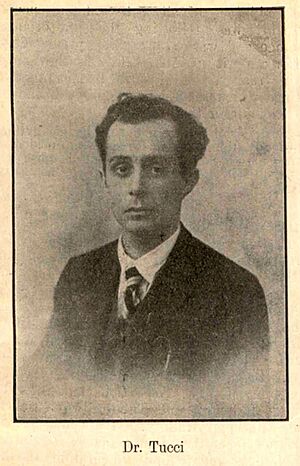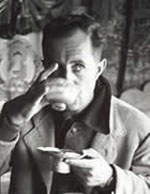Giuseppe Tucci facts for kids
Quick facts for kids
Giuseppe Tucci
|
|
|---|---|
 |
|
| Born | 5 June 1894 |
| Died | 5 April 1984 (aged 89) San Polo dei Cavalieri, Italy
|
| Nationality | Italian |
| Occupation | Orientalist, Indologist, scholar |
Giuseppe Tucci (born June 5, 1894 – died April 5, 1984) was an Italian expert who studied the East. He was especially interested in Tibetan culture and the history of Buddhism.
Tucci knew many languages, including several European ones, Sanskrit, Bengali, Pali, Prakrit, Chinese, and Tibetan. He taught at the University of Rome La Sapienza for many years. He is seen as one of the people who helped start the study of Buddhist Studies. During a time when Italian Fascism was strong, Tucci supported it. He used his knowledge of Asian traditions to help Italian political ideas.
Contents
Life and Discoveries

Early Life and Learning
Giuseppe Tucci was born in Macerata, Marche, Italy, into a middle-class family. He was very good at school. Even before going to university, he taught himself Hebrew, Chinese, and Sanskrit. When he was just 18, he published a collection of Latin writings.
He finished his studies at the University of Rome in 1919. His studies were paused several times because of World War I.
After graduating, he traveled to India. He lived at the Visva-Bharati University, which was started by the famous poet Rabindranath Tagore. There, he studied Buddhism, Tibetan, and Bengali. He also taught Italian and Chinese. He studied and taught at other universities in India, like Dhaka University and Calcutta University. He stayed in India until 1931, when he went back to Italy.
His Work and Fame
Giuseppe Tucci became Italy's most important expert on the East. He studied many different things, from ancient Iranian religion to Indian and Chinese philosophy. He mainly taught at the University of Rome. He also visited and taught at universities across Europe and Asia.
In 1931, the University of Naples "L'Orientale" made him their first professor of Chinese Language and Literature. In 1933, he helped create the Italian Institute for the Middle and Far East (IsMEO). This institute was directly connected to the Italian government at the time.
Tucci visited Japan in 1936 and 1937. He gave talks about Tibet and other topics. He also helped open the Italian-Japanese Institute in Tokyo.
He led several important archaeological digs in Asia. These included places like Swat in Pakistan, Ghazni in Afghanistan, and Persepolis in Iran. He also explored the Himalayas. In 1948, he led a trip to Tibet. On this trip, he was with Tenzing Norgay, who would later climb Mount Everest. Tucci met the Dalai Lama in the Potala Palace during this journey. He also met Heinrich Harrer, who wrote "Seven Years in Tibet."
Tucci also helped create the National Museum of Oriental Art in Italy. He received important awards for his work, like the Jawaharlal Nehru Award for International Understanding in 1978. He wrote more than 360 books and articles during his life.
His Political Connections
Giuseppe Tucci supported Italian Fascism and its leader, Benito Mussolini. His connection to this political movement started when he was a student. He met Giovanni Gentile, who was a close friend of Mussolini. Tucci's work with the IsMEO institute was also linked to the government.
From November 1936 to January 1937, Tucci was a representative for Mussolini in Japan. His goal was to improve relations between Italy and Japan. He also helped spread Italian political ideas. On April 27, 1937, he gave a radio speech in Japanese on behalf of Mussolini. His actions helped Italy join the Anti-Comintern Pact in November 1937. Tucci was also part of the team for a magazine called Yamato. This magazine was started in 1941 to strengthen the alliance between Italy and Japan.
He wrote articles for the Italian government. These articles often criticized the modern, industrial way of life in Europe. They suggested that a more natural and peaceful life could be found in Asia. According to expert Donald S. Lopez, Tucci saw Tibet as a peaceful place. He thought it was a "timeless utopia" where Europe could find peace and a cure for its problems.
Experts Hugh Richardson and David Snellgrove wrote a book about Tibet in 1968. They dedicated it to Giuseppe Tucci, saying he "revealed so many hidden treasures of Tibet life, art and learning." A made-up version of Tucci, played by actor Marcel Iureș, appears in the 2007 film Youth Without Youth.
Later Years
Giuseppe Tucci passed away in San Polo dei Cavalieri, near Rome, in 1984.
Images for kids
 | John T. Biggers |
 | Thomas Blackshear |
 | Mark Bradford |
 | Beverly Buchanan |


